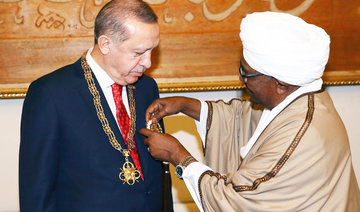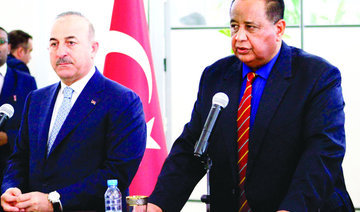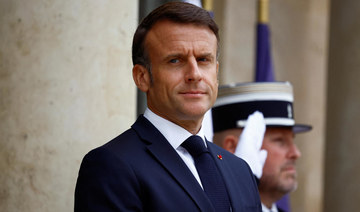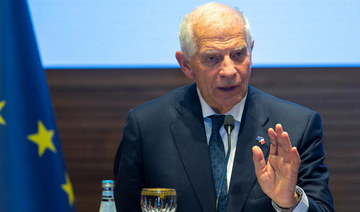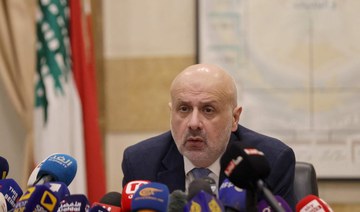CAIRO: Sudan on Thursday denied any military cooperation with Turkey over a controversial port after a meeting with Egypt to ease months of diplomatic tensions.
“There is no intention to establish a Turkish base, not in Suakin, nor any place in Sudan,” Sudanese Foreign Minister Ibrahim Al-Ghandour said in Cairo.
The meeting was called after the latest flare-up in decades of difficult relations, and as part of an agreement struck by Egyptian President Abdel Fattah El-Sisi and the Sudanese President Omar Al-Bashir at the African Union summit in Ethiopia last month.
On Jan. 4, Sudan recalled its ambassador to Cairo days after Egyptian media warned that Sudan was “playing with fire” by strengthening its ties with Qatar and Turkey.
Ankara signed a cooperation deal in December with Khartoum and agreed to carry out a series of reconstruction projects in Sudan worth $650 million.
These included rebuilding the port of Suakin on Sudan’s Red Sea coast. Turkey said this would increase tourism to Sudan and establish a transit point for pilgrims traveling to Makkah.
Egypt feared that Turkey planned to use Suakin as a military base to gain a foothold in the region.
At a press conference with his Egyptian counterpart on Thursday, Al-Ghandour stressed the area has 400 buildings and “it is a pure Sudanese property for Sudanese people only.”
“The Turkish president offered to renovate old houses and offered to be used as a tourist island for the common benefit between Sudan and Egypt,” he said.
During the meeting between the foreign ministers and heads of the intelligence services from the two countries, Egypt and Sudan agreed to stop their war of words, and strengthen relations.
Egyptian Foreign Ministry said the discussions were “very successful.”
Khartoum and Cairo have long disagreed over ideological and territorial issues, including the status of an 8,000 sq. mile piece of land known as the Hala’ib Triangle.
They also disagree over a multibillion-dollar dam Ethiopia is building on its share of the Nile. Sudan supports the project, but Egypt fears it will have a severe effect on water supplies downstream.
The statement said the countries would raise the level of bilateral cooperation to the highest level and set up a framework to open up coordination regarding the Ethiopian dam.
The two sides also agreed to improve cooperation in a number of areas including energy and infrastructure projects and communication between the foreign ministers.
Egyptian Foreign Minister Sameh Shukri said the two countries would raise security and political coordination to the highest level.
Al-Ghandour said the meeting was “a historic point in the relations between the two countries” and that the Sudanese ambassador to Cairo would return very soon.
He said relations between the two countries is a historical one of blood and brotherhood.
Sudan denies ‘military cooperation’ with Turkey over port investment
Sudan denies ‘military cooperation’ with Turkey over port investment
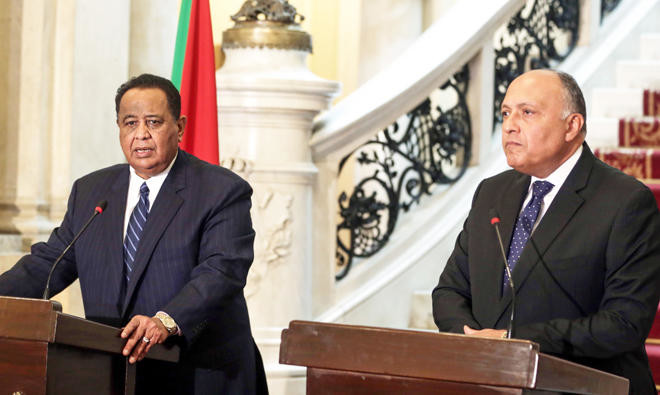
Arab League chief urges wider recognition of Palestinian state

- Ahmed Aboul Gheit issued the warning while taking part in a series of Arab League meetings with European foreign ministers
- The meetings in Brussels on Sunday and Monday discussed practical political solutions to end the fighting
CAIRO: The Arab League secretary-general said in Brussels that Israel’s aggression in the Gaza Strip could undermine any chance for peace and extinguish hopes of achieving a two-state solution, posing significant risks not only for the Middle East but also for international security.
Ahmed Aboul Gheit issued the warning while taking part in a series of Arab League meetings with European foreign ministers and other officials on the Palestinian-Israeli situation in light of the conflict in Gaza.
Hossam Zaki, Abdul Gheit’s assistant, said that the meetings in Brussels on Sunday and Monday discussed practical political solutions to end the fighting and subsequent steps to ensure peace.
During his discussions with European ministers, Aboul Gheit highlighted the need for more European countries to recognize an independent Palestinian state based on the June 4, 1967, borders, with East Jerusalem as its capital.
This would signal to Palestinian people that their right to independence is respected by Western countries, along with other nations in the world, he said.
Aboul-Gheit thanked the foreign ministers of Ireland, Norway, and Spain for their decision to recognize an independent Palestinian state.
Zaki said that the discussions revealed an increasing inclination toward addressing the situation collectively by convening an international conference to implement the two-state solution.
This approach is seen as the only way to save the region from prolonged and continuous violent conflict, he said.
Aboul Gheit, along with the foreign ministers of Saudi Arabia, Egypt, Jordan, Qatar, and Bahrain, urged European countries to move beyond merely discussing the feasibility of the two-state solution.
They advocated for clear and concrete steps to implement it on the ground, addressing the root causes of the conflict, Zaki said.
El-Sisi in Beijing to attend China-Arab cooperation forum

- The visit coincides with the 10th anniversary of relations between Egypt and China
- El-Sisi is also scheduled to meet the heads of several major Chinese companies
CAIRO: Egypt’s President Abdel Fattah El-Sisi arrived in Beijing on Tuesday on a state visit to China and to attend the China-Arab States Cooperation Forum after an invitation from President Xi Jinping.
El-Sisi will hold talks with Xi and senior Chinese officials focusing on ways to forge closer relations and unlock broader prospects for cooperation in several fields.
The visit coincides with the 10th anniversary of relations between Egypt and China being raised to the level of a comprehensive strategic partnership.
Ahmed Fahmy, spokesman for Egypt’s presidency, said the talks will also focus on regional and international issues of common interest, primarily the war in Gaza and ways to restore stability in the region and achieve the aspirations of its peoples for peace, security, and development.
El-Sisi is also scheduled to meet the heads of several major Chinese companies.
The meetings are expected to explore opportunities to attract more investment to Egypt in light of the state’s orientation toward enhancing mechanisms for the localization of industry and technology transfer.
Egypt is eager to collaborate closely with the private sector and encourage foreign direct investment.
El-Sisi will attend a meeting of the China-Arab States Cooperation Forum, to be held on May 30, with the participation of the Chinese president and a number of Arab leaders.
The forum will discuss various aspects of China-Arab relations and ways to further advance them.
Egypt’s government said the forum is a framework for dialogue and cooperation between Arab states and China. Its founding document was signed in September 2004 at the headquarters of the Arab League in Cairo following a visit by the Chinese president.
Mossad chief staged decade-long influence, intimidation campaign against ICC prosecutor

- Yossi Cohen sought to steer court away from investigating Israeli crimes in Occupied Territories
- ‘Despicable tactics’ used including ‘keen interest’ in prosecutor’s family, source tells The Guardian
LONDON: A former chief of Israel’s Mossad intelligence agency staged a years-long campaign of intimidation against a former International Criminal Court prosecutor in an attempt to sway war crimes investigations, The Guardian reported on Tuesday.
Fatou Bensouda, the former ICC prosecutor, became a target of Yossi Cohen in the years leading up to her opening a formal investigation into alleged war crimes in the Occupied Territories.
Launched in 2021, the investigation ended with the seeking of an arrest warrant for Israeli Prime Minister Benjamin Netanyahu by Bensouda’s successor Karim Khan.
Israel has long feared the results of the investigation, including the threat of prosecution against its military personnel, which was used as justification for Cohen’s decade-long campaign to undermine the court.
As Mossad director, Cohen, a close ally of Netanyahu at the time, was acting as the prime minister’s “unofficial messenger,” a source told The Guardian.
In total, four sources told the newspaper that Bensouda had briefed top ICC officials about Cohen’s campaign, which one official described as “stalking” and involving intimidation.
On several occasions, Cohen had “put pressure” on Bensouda to avoid opening the Palestine case at the ICC.
“You should help us and let us take care of you. You don’t want to be getting into things that could compromise your security or that of your family,” Cohen told her, according to the account of one ICC official to The Guardian.
As part of the targeted campaign against Bensouda, Cohen used “despicable tactics,” including taking a “keen interest” in her family, one source said.
Mossad obtained secret recording transcripts as well as photographs of Bensouda’s husband, which Cohen personally showed her.
His campaign was helped by the former president of the Democratic Republic of Congo, Joseph Kabila, in an unlikely alliance that proved crucial to Cohen.
It is unclear why Kabila aided him, but his status as the leader of a country facing ICC investigation helped him set up a “chance” meeting between Bensouda and Cohen.
The ICC prosecutor and Cohen appear to have first met at the Munich Security Conference in 2017, two years after Bensouda opened a preliminary investigation into the Palestinian file.
A year later, Cohen “ambushed” her in a New York City hotel as she was due to meet Kabila to discuss the situation in his country, The Guardian reported. Cohen’s “surprise” appearance was said to have “alarmed” ICC officials at the time.
He had earlier made a series of trips to the DRC, relating to what was described by Israeli broadcaster Kan as an “extremely controversial plan.”
Following the New York meeting, Cohen repeatedly phoned Bensouda to request further talks in an attempt to “build a relationship” and “play good cop,” sources told The Guardian.
But the influence campaign failed when in 2019, Bensouda announced that she had grounds to open a full criminal investigation into war crimes allegations in the Occupied Territories.
She first requested a ruling from the pre-trial chamber of the ICC, confirming the court’s jurisdiction over Palestine.
At this stage, Cohen stepped up his campaign against Bensouda into “threats and manipulation,” fearing the results of an official investigation being launched.
Senior ICC officials had suspicions that Israel had cultivated sources within the court’s office of the prosecutor.
In 2021, the ICC’s pre-trial chamber confirmed that the court had jurisdiction over the Occupied Territories. A month later, Bensouda formally launched the criminal investigation.
She said at the time: “In the end, our central concern must be for the victims of crimes, both Palestinian and Israeli, arising from the long cycle of violence and insecurity that has caused deep suffering and despair on all sides.”
Her successor, Khan, has vowed to prosecute “attempts to impede, intimidate or improperly influence” ICC officials after a warrant for Netanyahu’s arrest was sought.
The recent results of the investigation first launched by Bensouda represent a heavy blow to Israel’s international standing, and mark a failure of Cohen’s decade-long campaign to influence the court.
“The fact they chose the head of Mossad to be the prime minister’s unofficial messenger to (Bensouda) was to intimidate, by definition,” one source told The Guardian.
In response to questioning by the newspaper, a spokesperson for the Israeli prime minister’s office said: “The questions forwarded to us are replete with many false and unfounded allegations meant to hurt the state of Israel.”
Khan’s move last week to seek arrest warrants against Netanyahu marked the first time the ICC has taken action against leaders of a country closely allied with the US and Europe.
Netanyahu’s alleged crimes pertain to the war in Gaza, and include directing attacks on civilians and using starvation as a method of warfare.
Lebanon deputy looks to push Syria on refugee return

- Lebanese deputy leader Saadeh Al-Shami will head the committee
- Prime Minister Najib Mikati said that for the first time Lebanon has a “clear and specific action plan” on the Syrian refugee issue
BEIRUT: Lebanon has stepped up its push to have Syrian refugees returned to their homeland with the announcement of a Cabinet committee to negotiate directly with the Syrian government on the issue.
Lebanese deputy leader Saadeh Al-Shami will head the committee, which was set up during a Cabinet session on Tuesday with their aim of speeding up the repatriation process.
Speaking following a conference in Brussels on Monday on the future of Syria and the region, Prime Minister Najib Mikati said that for the first time Lebanon has a “clear and specific action plan” on the Syrian refugee issue.
Mikati said that Foreign Minister Abdullah Bou Habib, who represented Lebanon at the Brussels forum, had called for safe areas to be found in Syria so the return process could get underway as soon as possible.
Arab ministers from countries hosting Syrian refugees, including Jordan, Iraq, and Egypt, were urged to agree on a united plan to communicate with the Syrian government and “support early recovery in Syria.”
“During the conference, Lebanon emphasized the need for support and aid to encourage the Syrians to return to their country,” Mikati said.
In his speech, Bou Habib highlighted Lebanon’s continued cooperation, not confrontation, with international organizations affiliated with the UN.
International donors, led by the EU, pledged at the end of the conference to provide $5.4 billion to Syrians inside Syria and refugees in the region, in addition to more than $2.5 billion in soft loans to host countries.
Lebanon estimates there are at least 2 million Syrian refugees in the country, including those registered with UNHCR, workers, legal residents, and those who entered illegally.
Hostility toward Syrian refugees in Lebanon worsened after the abduction and murder of Pascal Suleiman, a local official in the Lebanese Forces Party.
Over the past two months, hate speech against Syrian refugees has escalated and work restrictions have been placed on them to hasten their return.
Lebanon is pushing ahead with plans to repatriate Syrians who entered the country illegally, and has organized voluntary return trips, but participation remains low, with only 225 people joining a convoy two weeks ago.
At the opening of the Brussels conference, EU foreign policy chief Josep Borrell rejected any discussion of refugees’ return to Syria.
“We consider that there is no safe, voluntary, and dignified return for refugees to Syria at present,” he said.
“Voluntary return must be voluntary; refugees should not be coerced. The situation in Syria today is more perilous than a year ago, humanitarian needs have never been greater, and efforts toward a political solution remain deadlocked.”
Meanwhile, Lebanese security forces are continuing to evict Syrian families living in illegal settlements across towns and villages in Mount Lebanon and the north as part of a crackdown.
On Tuesday, about 1,000 Syrians in Koubba in the Batroun region of northern Lebanon were evicted on orders from Ramzi Nohra, the North Lebanon governor.
Ahead of the Brussels conference, Amnesty International urged those attending to “ensure that any funds pledged to support Syrian refugees in Lebanon do not contribute to human rights violations, including forced deportation to Syria.”
The rights group quoted refugees in Lebanon saying they “live in fear, avoid leaving their homes, going to work, or sending their children to school.”
Dozens of municipalities have imposed curfews on Syrian refugees, and shuttered scores of small businesses and shops employing or run by Syrians nationwide.
Lebanon’s General Directorate of General Security has suspended procedures for granting or renewing residency permits through lease contracts, Lebanese sponsorship, or financial guarantees. It has also cautioned people against employing, hosting, or providing accommodation to undocumented Syrian refugees.
Jordanian minister receives American delegation in bid to boost foreign investment

- Saqqaf highlighted Jordan’s extensive network of trade agreements with numerous economic blocs
AMMAN: Jordan’s Minister of Investment Kholoud Saqqaf on Tuesday welcomed a high-level delegation of executive directors and representatives from prominent American companies, who are visiting Jordan to explore investment opportunities, Jordan News Agency reported.
During the meeting, Saqqaf highlighted Jordan’s extensive network of trade agreements with numerous economic blocs, which have enabled Jordanian exports to reach non-traditional markets and more than 1.5 billion consumers worldwide.
The visit of the US delegation, organized in coordination with the New York-based Business Council for International Understanding, will include meetings with various Jordanian ministries and public and private sector institutions.
The BCIU is a non-partisan organization comprising 200 major US companies, which works to expand international trade, provide essential services to facilitate global growth opportunities, and foster mutually beneficial relationships between business and government leaders worldwide.
Saqqaf emphasized the importance of strengthening economic and investment relations between Jordan and the US, noting that the free trade agreement between the two countries had significantly increased trade volume and encouraged new investments in Jordan.
She outlined key reforms undertaken by Jordan, including the approval of the investment environment law, the initiation of public-private partnership projects, and the launch of an investment promotion strategy targeting various countries, with a particular focus on the American market.
Saqqaf also highlighted improvements in Jordan’s national economy, citing satisfactory economic growth rates, low inflation compared with regional and global levels, and robust foreign currency reserves.
She pointed to Moody’s recent upgrade of Jordan’s credit rating from B1 to BA3, with a stable outlook, as further evidence of Jordan’s attractiveness as an investment destination.
Encouraging the American businesses to invest in Jordan, Saqqaf assured the delegation of the country’s supportive environment for their ventures. She highlighted various investment opportunities available through the Invest in Jordan platform (invest.jo) and reaffirmed Jordan’s openness to business and investment.
Representatives from the BCIU praised Jordan’s stable and secure environment, as well as the reforms aimed at improving the business landscape.
They expressed their commitment to promoting Jordan’s investment environment to their members and other American companies.


